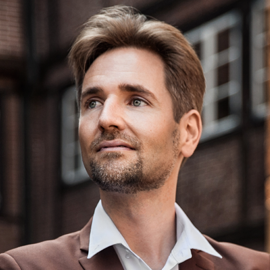
After the release of his debut album, "Reflections on Debussy" in 2012, Laurens Patzlaff was dubbed "Master of the art of improvisation" by the Deutschlandfunk. His second solo album, "The Sorcerer’s Apprentice", was featured in Piano News 2015, describing: "Patzlaff renders himself a ‘magician’ and ‘master’, which, unlike an ‘apprentice,’ has mastered all tricks and knacks."
From a young age, piano improvisation already began shaping the artistic creations of the pianist, who was born near Stuttgart/Germany in 1981. Alongside the classical piano repertoire, he still practised the almost forgotten art of stylistically bound improvisation as well as free, experimental improvisation and jazz. The piano – as an interdisciplinary instrument – is just as important to him as a broad, holistic view of music. Next to the educational musician, Robert Schumann, and the jazz pianist, Oscar Peterson, his role model has always been Leonard Bernstein, who rejected a distinction between serious and light music, pointing out that only the quality of the music was what mattered.
The musical versatility which really makes Laurens Patzlaff stand out was reflected in the various courses he studied at music universities of Stuttgart and Madrid, which he passed with distinction. Even as a teenager, Laurens Patzlaff was active as a chamber musician, forming his own piano trio and playing piano, keyboard, and the drums in several bands. Today, the multi-award-winning pianist is a regular guest at international music festivals in the USA, China, Australia and South Africa.
He has performed as a soloist in the Wiener Musikverein (Viennese Music Association) and in the John F. Kennedy Center for the Performing Arts in Washington D.C. He also regularly plays solo improvised piano recitals in many countries across Europe, Asia, and North & South America. He has worked with the South-west German Chamber Orchestra, the Stuttgart State Orchestra and the Neubrandenburg Philharmonic, to name just a few. This is topped off by masterclasses at over 30 music academies and universities worldwide. His speciality is piano improvisation. This has been the artistic and pedagogical focus of his work since 2008. He regularly taught this subject at the music universities of Stuttgart, Trossingen, Freiburg im Breisgau and Frankfurt/Main.
In 2013, he was appointed as Germany’s first professor for piano and improvisation playing at the Lübeck University of Music. The subject, ‘Piano and Improvisation’ attempts to revive the ideal of the universal pianist – which was still popular in the 19th century – by combining improvisation, playing compositions, as well as score-playing and accompaniment in one lesson.
Improvisation in the Piano Education A Forgotten Art?
Piano education in the 18th and 19th centuries followed a holistic approach in which improvisation played an important role. Many famous pianists such as Mozart, Czerny, Beethoven, Liszt and Chopin not only integrated this art into their concerts but also into their piano lessons. Since there are no sound recordings from this period, reports from contemporary witnesses, compositions and instructional works are the only sources that give us a glimpse of the diverse playing practices of the past centuries.
But improvisation in no way stands as a singular art alongside interpretation. The many pedagogical references by Czerny, Cramer, Hering, and Kalkbrenner suggest, that it has played an equal role within the ranks of the arts.
The keynote speech shows historical connections of piano education from the perspective of the Pianistes-compositeurs over the course of time. In addition, the multifaceted relationship between composer, interpreter, composition and improvisation will be illuminated. The following questions arise from consideration of the historical context: Which forms of improvisation existed? In which formats did these come to be performed? Why did improvisation practice change fundamentally in the 20th century? Can the knowledge gained from the teaching methods of the 18th and 19th centuries be used for a (necessary) change in the piano teaching of the present day?
Workshop on Piano Improvisation
Due to historical changes in the piano education worldwide, improvisation is playing more role in the education of children and young people, as well as in the curriculum at universities and conservatories. The approaches to improvisation are highly diverse. While a more playful approach is taken in youth education, an improvisational practice oriented towards contemporary music, style-bound fantasies and jazz fundamentals are mostly taught at universities.
Workshop participants will be offered comprehensive and versatile teaching approaches to improvisation. Four approaches are singled out from the multitude of possibilities:
- Contemporary improvisation on pictures, graphic notation and poetry based on extended playing techniques
- Several improvisation exercises for beginners
- Improvisation with historical sources
- Basics on Jazz improvisation for beginners
For each participant, the goal is to provide an approach to improvisation that she/he can continue to develop through self-study. In addition, didactic and methodological aspects will be discussed on how to apply the exercises in the lessons with children and students.
Besides the practical exercises, the psychological aspects of improvisation will also play a role in the workshop. Questions about the evaluation of creativity, possible benefits for musical development, and how to deal with fears and difficulties in improvisation will also be discussed.
Solo Piano Improvisation Concert by Laurens Patzlaff
Improvised concerts would normally be rather expected in jazz music. In classical music, they have become a rarity. In the 19th century, it was common for classical pianists to improvise in concert on themes suggestions by the audience. Laurens Patzlaff tries to bring this forgotten tradition back to life. The audience is invited to write down suggestions for themes on notepaper, which will be laid out at the entrance. There is no need to write down music, just the name of a famous classical work, a pop song, a jazz tune, a melody from advertising, from film music or a simple folk song is enough to create an improvised fantasy. Be part of a unique performance and witness live as music is created that you have never heard before in concert and that you will only hear once in this form.